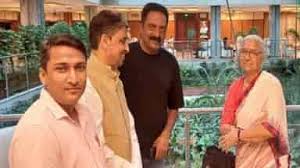BJP MPs object to Medha Patkar, Prakash Raj at parliamentary panel meeting, walk out

In a contentious session of the Parliamentary Standing Committee on Education, Women, Children, Youth, and Sports, several BJP Members of Parliament walked out on Tuesday. Their protest came in response to the inclusion of Medha Patkar and Prakash Raj as guest speakers. The incident sparked a political storm and drew criticism from various quarters.
The committee, chaired by Congress MP Vivek Tankha, had called the meeting to gather expert feedback on the implementation of the National Education Policy (NEP) 2020, focusing on school education. Patkar and Raj were among those invited to share their insights.
BJP MPs Raise Strong Objections
As the meeting began, BJP MPs Sudhanshu Trivedi, Mahesh Jethmalani, and Vineet Joshi objected to the presence of the two public figures. They argued that both had shown consistent bias against the government in the past and should not advise Parliament on policy.
“Medha Patkar has repeatedly opposed national infrastructure projects and disrupted development,” one MP said. “How can someone like her influence education policy meant to empower future generations?”
The MPs also targeted Prakash Raj for his vocal criticism of the government. They claimed his past statements reflected hostility, not expertise.
After registering their objections, the MPs left the meeting. They said they could not participate in a discussion that included people they considered politically motivated.
Patkar Defends Her Participation
Activist Medha Patkar responded calmly. She stated she attended the session not as a political figure, but as someone who has spent her life working with underprivileged communities.
“I shared my views on inclusive education, especially for children from displaced and tribal backgrounds,” Patkar said. “My intention was not to criticize anyone but to highlight ground realities.”
She emphasized that her work with the Narmada Bachao Andolan focused on justice for affected communities. According to her, giving such groups a voice in policy discussions is essential.
Prakash Raj Responds to the Criticism
Actor and activist Prakash Raj also rejected the claims made against him. He explained that he spoke about fostering creativity and freedom in school education, not politics.
“I was invited to offer insights from an artist’s point of view. We discussed how education can support expression, imagination, and independent thinking,” he said.
Raj added that in a democracy, representatives must listen to all views—even those they disagree with.
Panel Chair Stands by the Invitees
Committee chair Vivek Tankha defended the decision to include Patkar and Raj. He said their backgrounds in activism and public life offered valuable insights into the education system’s gaps and opportunities.
“We invited them for their experience and domain knowledge. This was not a political endorsement,” Tankha said.
He added that walking out of a meeting shuts down conversation and undermines the purpose of such parliamentary committees.
Opposition Leaders Criticize BJP’s Move
The Congress and other opposition parties reacted strongly. They accused the BJP of trying to control public debate and exclude critical voices.
“BJP wants rubber-stamp experts who praise everything they do,” said Congress spokesperson Supriya Shrinate. “Medha Patkar and Prakash Raj have spoken truth to power, and that seems to scare them.”
Opposition leaders argued that Parliament should reflect a broad range of opinions, especially when crafting something as crucial as education policy.
Civil Society Voices Alarm
The walkout prompted concern among civil society groups. Over 50 organizations issued a joint statement condemning the BJP MPs’ actions. They described the move as an attack on democratic values.
“These are respected citizens who work at the grassroots level. Ignoring them weakens the policymaking process,” the statement said.
Activists warned that excluding diverse voices leads to policies that fail to address real-world challenges.
Education Experts Emphasize Dialogue
Education professionals also weighed in on the controversy. Many supported the inclusion of activists like Patkar in policy discussions. Professor Amita Sharma, a former NCERT official, explained why such participation matters.
“People who work directly with children from marginalized backgrounds bring insights that data alone can’t reveal,” she said.
She emphasized that open dialogue ensures policies remain grounded in reality.
BJP Demands New Guidelines
Following the walkout, BJP MPs called for new rules on inviting guest speakers to parliamentary panels. They argued that the current system allows biased individuals to influence critical discussions.
One MP stated, “We support expert feedback, but there must be balance. We cannot give space to people who routinely attack the government.”
The BJP plans to raise the issue formally in future committee sessions.
Despite Walkout, Session Continues
Despite the drama, the meeting continued. Patkar and Raj presented their recommendations. They focused on equal access to education, curriculum decentralization, regional languages, and creative learning strategies.
Observers said both speakers stayed focused on education and avoided political commentary during their presentations.
The committee will continue deliberating on the NEP 2020 in the coming weeks. A detailed report is expected later this year.
Broader Implications for Democracy
The walkout has opened a broader debate about who gets to speak in Parliament. Critics argue that limiting participation to government-aligned voices turns democratic spaces into echo chambers.
In contrast, the government’s supporters believe objectivity suffers when critics dominate public forums.
As India prepares for deeper reforms in its education system, questions around inclusion, dissent, and democratic engagement will remain front and center.and every voice counts.






